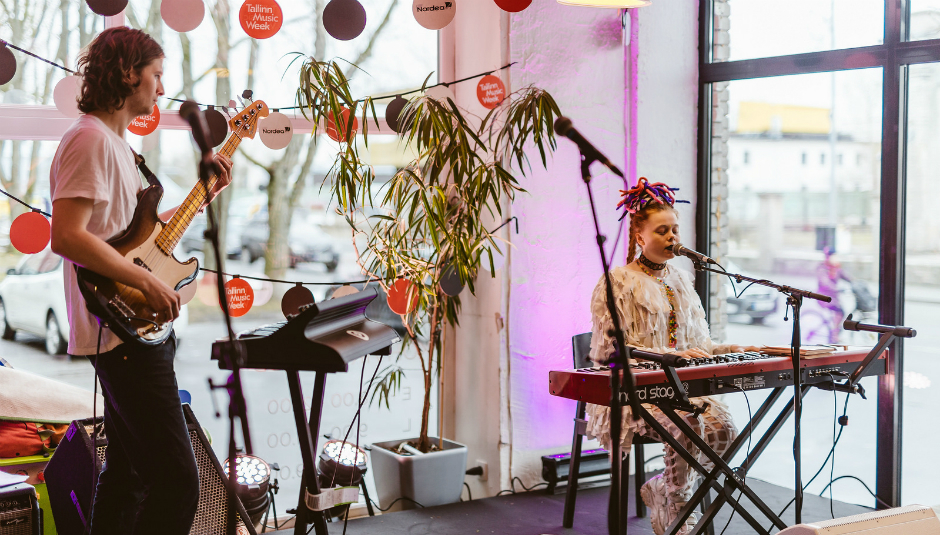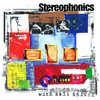Showcase festivals are fast becoming an integral part of the festival market. International events are springing up across Europe in the hope of attracting international media and industry buyers, and creating opportunities for discovering local talent. As the main festival season starts to unfold, DiS headed to Estonia to experience one of the most respected events in the European showcase calendar and hear the story of Tallinn Music Week.
Now in its ninth year, the festival brings together over 250 artists from the Nordic countries, Russia, and further afield. Contemporary classical, jazz, modern folk, metal, and experimental electronic sounds are all part of the mix. Over the years the festival has expanded to include elements such as design markets, gallery evenings, and “national cuisine spots”, to present a broader spectrum of cultural activity and encourage creative thinking. Venues taking part in TMW 2017 include Tallinn Botanic Gardens, churches, factories, a bookshop, a bakery, and residents' own homes.
We met Helen Sildna, founder of Tallinn Music Music, in a busy shopping centre that doubles as one of TMW performance spaces. Having just witnessed an energy-packed set by World Beatbox Champion Bellatrix from London and Estonian-American composer and conductor Kristjan Jarvi, she’s enthusiastically sharing her thoughts on the future of festivals, Brexit and the death of genre.
DiS: Can you tell us about your background and why you started Tallinn Music Week.
Helen Sildna: My whole professional career has been in the music business. I started working for the biggest promoter in the Baltics, now owned by Live Nation. When I was 21 I became a talent booker for all the big arena shows. My job was mainly importing international talent to Estonia, Latvia, Lithuania and sometimes to Russia. Then I realised that something was missing. First of all, nobody was working with clubs promoting new music and local artists. There was a pool of talent, young grassroots creativity and initiative, but nobody was really developing the scene. That was the backdrop to starting Tallinn Music Week. We wanted to create a platform that would give more opportunities to the local artists and also create a networking forum for different countries to collaborate. It's kind of bizarre to look back to the starting point: it was very rare for a Finnish band to play in Tallinn regularly, or a Latvian band to perform in Estonia.
So right at the very beginning, you envisaged your festival as an international event?
Yeah, I was going to events like The Great Escape, Eurosonic, or SXSW, so I thought: “Tallinn is a great city with so many interesting venues and the music scene is getting really interesting. Let's create a hub here. Let's bring international guests to come and experience the music in this setting.” Music was the base foundation of Tallinn Music Week. It still is, even though we've expanded to very many other areas. Music is the creative engine. We always make sure that the music part never loses its focus and the quality of the music programming remains high.
Someone said to me this morning that Tallinn Music Week is not really a festival but a way of thinking.
It's beautiful for me to hear that. When we started the festival our first impulse was to create a music festival across all genres. We talk a lot about music democracy. In a way, if you're an open-minded person that's how you experience music nowadays: you like hip hop, you like classical music, you like metal, you like avant-garde electronics... That's the way I listen to music. If somebody asks me what music I listen to I never answer by genre. Right at the start, we wanted to create more opportunities and more equal opportunities. We think that contemporary classical and underground techno should be regarded as equal forms of cultural expression. It's all about free self-expression. It's always been a big part of the discussion through the years. There's been a lot of focus on talking about freedom of speech and freedom of expression. For example, when Pussy Riot were arrested, this subject was brought up by the former president of Estonia Toomas Hendrik Ilves. We had an interview with Pussy Riot and a discussion about rock'n'roll as the embodiment of free expression. Society and politics always come into this festival. Not in any sense of party politics but the way society operates. I use the term “holistic” quite a lot. We like this idea of a connected society with horizontal values. Entrepreneurship, creativity, innovation, and sustainability are all part of the same value system. This year's conference theme is Creative Impact, and we don't just mean creative industries. What we really discuss is the impact of creativity in a wider sense, like the tech sector or in service design. Everybody needs encouragement and the feeling that they are more opportunities out there. That's the core thinking behind Tallinn Music Week. It's about inspiring people. It started with musicians but it's gone in very many directions now.
As well as refreshingly different subjects discussed at your conference, I couldn't help noticing that you have a lot of female speakers. Sadly, it's not something you see very often. Was this a deliberate strategy or something that came about naturally?
We deliberately started re-focussing. Three years ago we set ourselves a target. Although we've still some way to go to having 50% female speakers, we don't have all-male panels. We really pay attention and want to give equal opportunities. Last year 67% of delegates were men and 37% women. I see no reason why there should be a bigger proportion of men in the creative industries. No reason at all. I'm a firm believer in the concept that change doesn't happen on its own. Change must be driven. If you want something to change, you have to decide on the steps you need to take in order to get there. If you think you need to have 50% female speakers, then work out what you need to do to achieve this and do it!
I've seen some familiar faces but it's also exciting to see delegates from frequently under-represented countries like Russia and Belarus. Do you think in the future, especially in the context of Brexit, UK industry influence is going to wane?
Many things have changed since I started in this business. It used to be that all European live booking agents were based in London and all North American agents in LA or in NYC. Now there are so many very good agencies, record labels, and independent music companies all around Europe, in every single country. There is no real reason why it should be centred around one country.
But there is still this latent reverential attitude about British pop culture.
Yeah, I think part of it is language-related. English is the dominant language of tastemaker media. We talk a lot about the digital single market in the context of the EU. Services like streaming are a way of making things more equal. It's good news for a small country like Estonia. Digital economy makes it less important where you're from, so it's more open. Iceland, for example, is a tiny country but a real culture hub. Having said that, Brexit is something we're all very sad about. We don't want to lose the UK as a partner and I'm sure we won't because there's a lot of interesting things happening there. Friday’s opening panel will be discussing the future of Europe and pop culture in the context of Brexit. Tallinn Music Week has been part of Creative Europe programmes and most of the time there's been a UK partner. This loss would be enormous, both for the UK and everyone else.
Going back to the subject of live music, are there many festivals in Estonia? How does Tallinn Music Week fit into the overall festival market?
I've heard it said there are something like 3000 music festivals in Estonia. Of course, some of them are really tiny but music culture is really strong here. Most of the time a festival promoter is also a gig promoter, and sometimes they also run a venue. Estonia is a young market, so companies are often just one person. They can't afford a full team. Our programming team consists of 50 different concert promoters and music brands. There is absolutely not a single programme manager who could programme equally well classical music and metal, so we bring in these promoters who become part of our team. For example, Estonia's biggest jazz festival puts together our jazz programme and folk festival promoters are curating folk music. Sometimes we have huge team meetings. We're a united team because the programme has to make sense as a whole.
And how big is your team?
We're in our ninth year and it's the first year that we have a full-time team. We have seven people in the office. From December the team starts growing: our core team together with production and marketing increases to 20 people. When you add our programming team of 50 promoters, you have about 70 people overall. This year we have also close to 300 volunteers.
Obviously, one of your main objectives is to promote local talent. Do you have targets for the proportion of Estonian v international artists on your bill?
We don't have a quota but around 60% is local talent. Every year we get more and more applications and proportion of international acts has increased. It's really good for the local scene because they need to realise where they stand in the global context. One of the goals is to help local artists to play outside of Estonia. It's really important they understand what else is out there.
Funding is a big topic for any festival. What proportion of the money comes from ticket sales, sponsors, etc?
About 60% of our funding is private. Half of that is tickets and delegate passes. The other half is sponsorship deals with private companies. The remaining 40% is public sector money like the Ministry of Culture, Enterprise Estonia, or money from the city of Tallinn. Our money comes from about a 100 different funding sources.
Showcase festivals are now a global phenomenon. I spotted a very timely question in your conference programme: Are showcase festivals eating into the festival market? What's your personal take on this matter?
I'm quite critical about this. To have a showcase festival, you really need to question the value of what you're offering to the artists. The showcase concept is spreading and there's EU funding available. Seminars, conferences, export and internationalisation...it's an easy concept to get funding for, and it's a good way of getting artists to play for free. I totally agree that there are more showcase festivals than anyone needs. I think it's also related to the fact that festival market is in transition right now. I think in five years time things are going to change dramatically. I don't think there is any future in the big headliner mega festivals. The way we listen to music these days is based on diversity and variety; it's not based on superstar names. The industry is still asking where the next Bono or Madonna going to come from but I think the future is in well-curated, smaller, and smarter boutique events. We don't really want to call ourselves a showcase festival anymore; we're a festival for open-minded people presenting different art forms and introducing new talent. I just wish people would experiment with different formats more. It's kind of boring to see that everybody is copying each other's formats.
In the UK many of the bigger, often well-established events are not selling that well anymore.
That's the thing, long history is no guarantee of success. You have to constantly re-invent yourself. Quite truthfully, I'm surprised that this headliner format has lasted this long. The lineups of big festivals are very similar to each other every year. They depend on big artists touring. Everybody is fighting for the same names, and these days there is so much competition. We don't just compete with other festivals, we compete with other forms of live and online entertainment, social media, news... I'm excited about this. I think the days of hardcore mainstream marketing are numbered. Clever communication and better content is a way forward. In tourism, for instance, people have more trust in blogs and social media. I think eventually we will win, and those with something good to say will be in a better position.
Lastly, do you see Tallinn Music Week as something specific to Tallinn? Would you consider exporting your festival format to another location?
I think it's strange to see Lollapalooza or Sonar in different locations around the world. There is this trend of copying festivals like a franchise. I'm interested in creating an atmosphere tied to a specific location. If I ever set up a festival elsewhere, it would be an entirely different thing. I get excited about authenticity rooted in a location. Tallinn Music Week is what it is because of the city and the culture it produces.
Everything you've said highlights the fact that the socio-economic backdrop and heritage are very important elements of Tallinn Music Week.
In all honesty, I don't think we're in the entertainment business. We want to create meaning that would give relevance to the community, that would actually help people's lives. It's about creating more opportunities. It's connected to the music business but there is a human aspect of people using their talent and expressing themselves. Saturday’s conference programme has this talk about a ballet school in one of the biggest slums in Nairobi. I'm super excited about it. Through this ballet school, people were able to find hope to rebuild the whole community. You give people tools, open more opportunities and you've changed something in a way they think. Suddenly they start behaving in a different way. Icelandic music broke the minute Bjork became huge, and suddenly everyone felt they could do it if she could do it. Opening these truths, saying that things can be done is super important for the whole community. I would never put that much energy, money, sleepless hours into just having a festival for fun. I wouldn't be interested or motivated. I'm more interested in creating meaning for people.
For more information about Tallinn Music Week visit their official website.






















